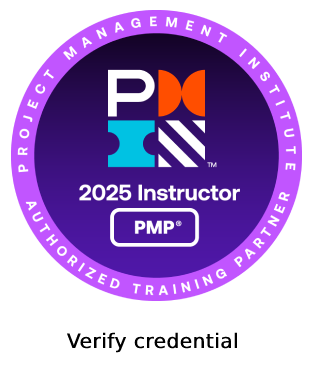Course Description
Risk Management is a critical discipline that helps people better manage uncertainty and threats, and Risk Management for Project Managers explores the topic as it applies to projects and programs of a technical nature. Comprehensive in scope and designed for all stakeholders who want to proactively mitigate the effects of risk, this course covers all the fundamental aspects related to risk management, including planning, identification, assessment, quantification, analysis, mitigation and tracking & reporting. A wide spectrum of risk management tools and techniques will be explored, along with the “softer” disciplines of psychology and human interaction.
The ability to quantify and manage risks before and during a project is a key skill required of all project managers. In this training course, you learn how to identify, measure, and analyze risks in projects of all sizes and scopes, and how to ensure the success of your projects from beginning to end by quantifying and creating risk response strategies.
Course Downloads

Thank you Dr. Petros for the clear explanation about PMP so that I could prepare for the exam further. I have attended the PMP Exam Prep Bootcamp and still remember the PMP concept he gave me during course. Thanks again for the keywords he often said which (…)
Key Features of Risk Management Fundamentals
Who Should Attend
This workshop is designed for managers, engineers, and other individuals who are involved with projects and need to understand risk management and how to deal with it in a proactive manner.
Delivery Method
Prerequisites
- No pre-requisites required.
Course Duration
- 2 days. PMPs are eligible for 14 PDUs
- Understand how risk can impact a program
- Understand all of the steps of a comprehensive risk management approach
- Identify various tools and techniques to employ for risk management
- Be able to determine which risk mitigation approach to choose using the concept of risk reduction leverage
- Discuss and explore ideas, concerns and issues related to risk management
- Manage risk to deliver initiatives that meet stakeholder needs
- Apply scalable templates for your initiative with Risk Management Plans,
Risk Registers, and Risk Assessment Matrixes - Leverage a proven qualitative risk-analysis process to guide your risk
management decisions
- President of PMI Thailand Chapter for 13 years (2011-2023);
- Currently Past President and Chapter Counselor.

- He is a Certified Program Management Professional (PgMP®) (Project Management Institute – www.pmi.org); Certificate # 2079271.
- He is a Certified Project Management Professional (PMP/CAPM®) (Project Management Institute – www.pmi.org); Certificate #1258917
- He is an Agile Certified Practitioner (PMI-ACP®) (Project Management Institute – www.pmi.org); Certificate #2600926
- He is a Certified Scrum Master (CSM®) (Scrum Alliance – www.scrumalliance.org); Certificant ID: 001062861
- He is a SAFe Program Consultant (SPC)® 6.0; Certificate ID: 50804412-3031
- He is a SAFe Agilist® 6.0 (www.scaledagile.com); Certificate ID: 23353981-8934
- He is Certified Risk Management Professional (RMP®) (Project Management Institute – www.pmi.org); Certificate #2033120
- He was Vice President at one of the largest Thai Systems Integrator public company for more than 10 years.
- He has experience managing and leading mega-projects (Information Technology, Airport-related, CCTV-related, Transport-related, and Power Infrastructure) in various industries.
- He is a commercial contract manager, reviewer, and advisor.
- He teaches part-time at King Mongkut University of Technology (Thonburi) – Graduate School of Management and Innovation (Master Degree in Project Management). He is an invited lecturer to Chulalongkorn University.
- He holds a Doctorate degree obtained from Assumption University of Thailand with an international record of publications in refereed journals with a special concentration on business management.
- He has trained more than 5000 program/project managers, project engineers, project coordinators, and project team members since 2010.
- He has helped certify more than 800 Project Management Professionals (PMP/CAPM) in Thailand.
- He is also a highly experienced speaker and trainer who is also passionate about Project Management.
Detailed Course Syllabus
PMI RMP Exam Preparation
฿39,000.00
Course Content
- Proactive risk management and its key elements
- Definitions, including the different faces of risk: opportunity and threat
- Three key risk components involved in the nature of risk
- Risk categories including the use of the Risk Breakdown Structure (RBS)
- Risks versus Issues
- Goals of risk management
- Nature of risk and why risk identification is difficult
- How risk can impact your project
- Life cycle truths that drive early risk management efforts
- Psychology of risk
- Key inputs for planning risk management
- How to build the plan
- Essential content
- How to perform a qualitative risk analysis
- How to perform a risk data quality assessment
- How to determine overall project risks
- How to prioritize those risks that must be managed
- Calculating expected loss
- Calculating expected opportunity
- Use of probability distributions
- Sensitivity analysis
- Decision Trees
- Modelling and Simulation
- Techniques for dealing with risk
- Techniques for dealing with opportunities
- Cost analysis of responses using Risk Reduction Leverage
- Risk Response Matrix
- Tips and Advice on Risk Responses
- Risk Triggers
- Risk Owners: roles and responsibilities
- Residual risk
- Risk exit criteria
- Contingencies and reserves in risk management
- Tracking Fundamentals
- Tools and Techniques
- Dealing effectively with new risks
- Risk Reporting
- Tips on having a successful risk management effort
We’ve Trained Professionals
across Global Companies













































Need more information on Trainings?
We’re a click away
Free Shipping
Free Shipping for orders over £130
Money Guarantee
Within 40 days for an exchange.
Flexible Payment
Pay with Multiple Credit Cards
Online Support
24 hours a day, 7 days a week
Don't compromise on quality!
Subscribe to the newsletter
- TEL : 0980 444 45 456
- MAIL : hello@demo.com
Don't compromise on quality!
- TEL : 0980 444 45 456
- MAIL : hello@demo.com
About Wooma
Help
Categories
Campaigns
Company
Resources
Contact Details
-
200/05, Narathiwat Ratchanakarin Road,
Chongnonsi Yannawa, Bangkok 10120 - info@projectvictor.com
- (66) 92 348 4772
- (66) 02 294 2492
Copyright © 2025. Project Victor Co., Ltd. All Rights Reserved.
- Call us on (66) 92 348 4772
“PMI,” “PMP,” “CAPM,” “PMI-ACP,” “PMBOK,” and the PMI Authorized Training Partner logo are registered marks of the Project Management Institute, Inc.
“ITIL®,” “PRINCE2®,” “MSP®,” and “P3O®” are registered trademarks of AXELOS Limited, used under permission of AXELOS Limited. View Disclaimer



